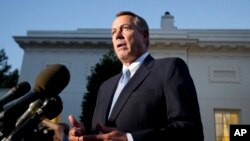CAPITOL HILL —
President Barack Obama met with congressional leaders of both parties for the first time since a partial U.S. government shutdown began earlier this week. Expectations for the meeting varied greatly among Democratic and Republican lawmakers, who remain deadlocked on extending federal funding.
House of Representatives Speaker John Boehner emerged from White House talks to say that President Barack Obama again refused to negotiate with them to end a government shutdown.
After more than an hour of talks between Obama and congressional leaders, the top Republican in Washington told reporters it was a polite conversation, but essentially made no progress.
For days, Democrats repeatedly have stated they will not negotiate with Republicans on the fiscal impasse as long as Republicans have partisan stipulations for reopening the federal government. To do otherwise, Democratic lawmakers insisted, would be the legislative equivalent of negotiating with hostage-takers.
That stance, echoed by the president, led Republicans to label Democrats as inflexible hardliners who are unwilling to resolve differences through dialogue and compromise.
News that the president would meet with Democratic and Republican leaders of both houses of Congress elicited a positive response from House Speaker John Boehner. His spokesman issued a statement saying Republicans are pleased that “the president finally recognizes that his refusal to negotiate is indefensible.”
Republican Congresswoman Cathy McMorris Rodgers also welcomed discussions.
“We have got to start talking, we have got to come to the table, we have got to start negotiating, because all across the country, Americans are being impacted,” she said.
But Republicans are misreading Obama’s intentions, according to White House spokesman Jay Carney.
“He [Obama] will not negotiate. He will not offer concessions to Republicans in exchange for not tanking [harming] the economy,” he said.
One participant at the White House meeting, Senate Majority Leader Harry Reid, was non-committal beforehand on what might be accomplished.
“I did not call the meeting. The president called the meeting. I will go to the meeting,” he said.
Reid revealed he had sent a letter to Speaker Boehner earlier in the day, agreeing to bicameral negotiations on a broad range of fiscal challenges - but only after the government shutdown ends. Democratic Senator Charles Schumer said there is no reason to keep federal operations halted while negotiations go forward.
“Republicans have this exactly backwards. They say, ‘Let us talk, and then maybe we will open the government.’ They ought to say, “We will open up the government, and then we can talk,’” said Schumer.
Senate Democrats sought to jumpstart their proposal by bringing it to the chamber floor. Republicans objected to its adoption. Meanwhile, the Republican-led House of Representatives voted to approve temporary emergency funding for a selected number of federal entities, such as national parks. Reid has said the Senate will only approve a full reopening of the federal government with no Republican stipulations attached.
House of Representatives Speaker John Boehner emerged from White House talks to say that President Barack Obama again refused to negotiate with them to end a government shutdown.
After more than an hour of talks between Obama and congressional leaders, the top Republican in Washington told reporters it was a polite conversation, but essentially made no progress.
For days, Democrats repeatedly have stated they will not negotiate with Republicans on the fiscal impasse as long as Republicans have partisan stipulations for reopening the federal government. To do otherwise, Democratic lawmakers insisted, would be the legislative equivalent of negotiating with hostage-takers.
That stance, echoed by the president, led Republicans to label Democrats as inflexible hardliners who are unwilling to resolve differences through dialogue and compromise.
News that the president would meet with Democratic and Republican leaders of both houses of Congress elicited a positive response from House Speaker John Boehner. His spokesman issued a statement saying Republicans are pleased that “the president finally recognizes that his refusal to negotiate is indefensible.”
Republican Congresswoman Cathy McMorris Rodgers also welcomed discussions.
“We have got to start talking, we have got to come to the table, we have got to start negotiating, because all across the country, Americans are being impacted,” she said.
But Republicans are misreading Obama’s intentions, according to White House spokesman Jay Carney.
“He [Obama] will not negotiate. He will not offer concessions to Republicans in exchange for not tanking [harming] the economy,” he said.
One participant at the White House meeting, Senate Majority Leader Harry Reid, was non-committal beforehand on what might be accomplished.
“I did not call the meeting. The president called the meeting. I will go to the meeting,” he said.
Reid revealed he had sent a letter to Speaker Boehner earlier in the day, agreeing to bicameral negotiations on a broad range of fiscal challenges - but only after the government shutdown ends. Democratic Senator Charles Schumer said there is no reason to keep federal operations halted while negotiations go forward.
“Republicans have this exactly backwards. They say, ‘Let us talk, and then maybe we will open the government.’ They ought to say, “We will open up the government, and then we can talk,’” said Schumer.
Senate Democrats sought to jumpstart their proposal by bringing it to the chamber floor. Republicans objected to its adoption. Meanwhile, the Republican-led House of Representatives voted to approve temporary emergency funding for a selected number of federal entities, such as national parks. Reid has said the Senate will only approve a full reopening of the federal government with no Republican stipulations attached.




